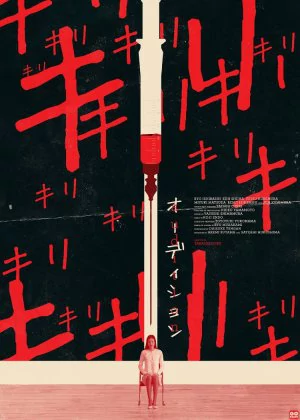Audition
Movie details

Takashi Miike is one of the wildest directors Japan has ever seen. He is known for many things in the West, but restraint isn't one of them. That's probably the reason people took notice when he released Audition [Ôdishon]. It's one of the rare films in his oeuvre that brought everything into balance, a trait certainly appreciated by Western film critics and festival crowds. I liked the film a lot the first time I watched it, but was somewhat unsure of how it would fare on consecutive viewings. That's probably why I waited so long to revisit it. I couldn't postpone it forever though, so I finally took the jump and gave Audition another go.
![screen capture of Audition [Ôdishon]](/thumbs/img/articles/1200xauto/audition-1.webp)
As many grew indifferent towards the novelty value of Miike's work, Audition turned out to be one of his films that was best equipped to resist the reevaluation of his oeuvre. It's no surprise then that two decades after his international awakening, Audition is often cited as one of Miike's pivotal films and put forwards as a perfect introduction to the man's massive, eclectic body of work. It may not be the film to prepare you for the breath of his talents, and it certainly underplays some of the crazier films he is celebrated for, then again there simply isn't a single film that can wholly capture Miike.
What makes Audition stand out is that it is very restrained and minutely constructed. Most Miike films are known to alternate highs and lows, thriving on surprise and wonder to overcome their structural inconsistencies. Audition on the other hand applies a well-considered structure that is integral to the strength of the film. The first hour is deceptively low-key, almost lulling the audience to sleep, only to build up to a pretty crazy and memorable finale during the second half, made all the more effective because of the strong contrast with the first part. It's a smart setup and perfectly executed, exemplified by the fact it still worked the second time around when I already knew exactly what was to come.
After Aoyama's wife died, he spent all his time working and providing for his little boy. Seven years later, the kid tells his dad the time might be right for him to find a new wife. Aoyama considers the proposition and goes to ask a friend for advice. He tells Aoyama he should join him on an audition, as there are plenty of proper single women that are prime wife material. Aoyama, not entirely sold on the idea, reluctantly agrees and bumps into Asami as he is going through the applicants. He is immediately smitten by the girl, and she seems interested as well. What Aoyama doesn't know is that Asami harbors a pretty dark secret.
![screen capture of Audition [Ôdishon]](/thumbs/img/articles/1200xauto/audition-2.webp)
The first half of Audition plays like a very low-key Japanese drama and Miike makes sure the visuals match that vibe. He doesn't even attempt to make it look pretty, sticking with dulled, cold colors and functional camera work while chasing a more natural and unfiltered look. That all changes when the film flips halfway through. A stronger, more evocative color palette, starker compositions, and more explicit camera work drive up the tension and mystery and foreshadow the film's excessive ending. Audition is one of the few films where I will gladly forgive a director some functional ugliness.
The soundtrack follows a very similar pattern, though doesn't get quite as outspoken as the visuals. At least, the music itself doesn't. The score is moody and atmospheric and does more than its fair share of the heavy lifting in the second half of the film, but never really demands center stage. The sound effects on the other hand do leave a sizeable impression. From the growling sack to the notorious kiri-kiri noises during the grand finale, these are sound bites that stick in your brain and have even come to define the film for many. A clear example that sound design can be just as effective as a good score.
For a film like this you need a good cast and Miike really hit the jackpot here. Ryo Ishibashi is perfect for his part, Jun Kunimura and Renji Ishibashi excel in supporting roles, and it's no exaggeration to claim that Audition put Eihi Shiina on the map and will forever be the part she's primarily associated with (yes, that's also taking Tokyo Gore Police into account). The extreme switch her character makes throughout the film is crucial to the payoff of the entire setup and Shiina pulls it off without a hitch.
![screen capture of Audition [Ôdishon]](/thumbs/img/articles/1200xauto/audition-3.webp)
Sitting through Audition for the first time and realizing how the setup of the film is essential to the experience and impact is quite a treat. But once you see how everything works and fits together, you can't help but wonder how consecutive viewings will pan out. And truth be told, the first hour of this rewatch I was pretty skeptical, to the point where I stopped believing this film would hold up. Then Miike starts the metamorphosis, and suddenly everything clicked again. That's quite a trick to pull on someone who is fully aware of how the magic is supposed to work, and that's no doubt this film's biggest strength.
For people unfamiliar with Miike's vast oeuvre, Audition is a perfect gateway. It offers something for almost every type of film fan, giving you some glimpses of Miike's trademark crazy, but also showcasing his ability to control himself and deliver quality cinema. Audition will lull you to sleep with its understated, consciously tepid build-up, only to shake you away and leave you stunned and surprised after unleashing its madcap finale. Going into this rewatch, I honestly wasn't expecting to be writing this review, it's a testament to Miike's talent that I ended up having to write it anyway.